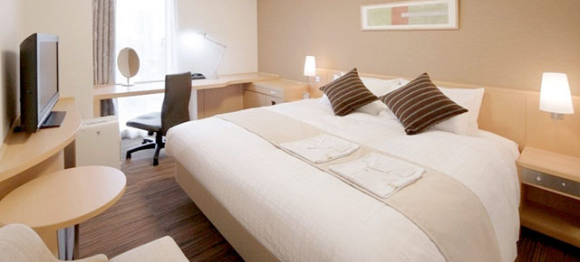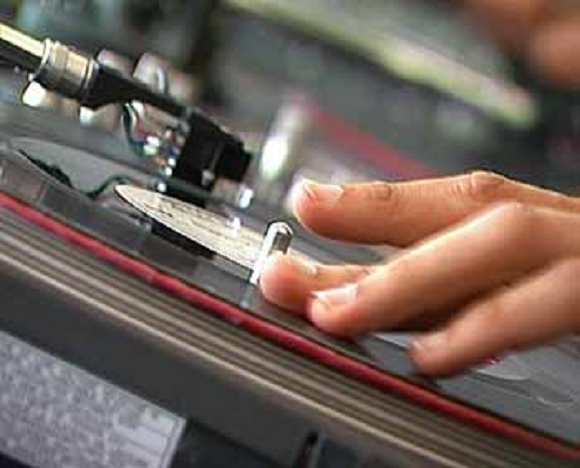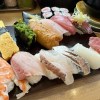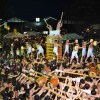It’s time once again for an episode of Why Does Engrish Happen in Japan? If you missed the first installment (which we really should have given a clever name like Why Does Engrish Happen in Japan? ~Unexpected Opening to the Truth~) you can check it out here.
Today, we’re taking a look at a hotel in Japan that seems to be clamping down on solo peeing, with a sign posted in its lobby that requests visitors “Please refrain from using the bathroom alone.”
At first glance, this might seem like the sort of announcement you’d come across in a love hotel that specializes in a very specific kind of clientele. That’s not the case, though, as the very bottom of the sign identifies the location as a branch of the Richmond Hotel, which offers mid-range accommodations for both business and leisure travelers.
▼ The atmosphere is more “comfortable” than “kinky.”
While Richmond has properties all over Japan, none are in any neighborhoods so rough that you need to have a friend watch your back while you take a leak (honestly, Japan is so safe that taking a dump without backup is never something to worry about). And while many Japanese hotel chains have become more conscious of the environment over the last decade, their eco-friendly policies are usually along the lines of not replacing the guestroom toilet paper roll until it’s completely used up or only providing a new set of towels during a two-night stay if the customer specifically requests it. In other words, the Richmond Hotel isn’t asking that guests maintain a ratio of at least two deposits in the bowl for each flush.
So now that we’ve eliminated those possible explanations, let’s move on to the real culprit, mistranslation, and break it down like a bunch of bilingual DJs who’re overly fond of shouting “Word!” in multiple languages to try to amp up the crowd.
▼ Even if he’s in it, M.C. Linguistics is too dedicated to his field to ever use the word “hizouse.”
First, let’s take the original Japanese and write it out using the English alphabet.
Otearai nomi no goriyou ha goenryo itadaite orimasu.
The o in otearai and go in both goriyou and goenryo are just prefixes tacked on to make those words more polite. It’s a common practice in the service industry, but they’re not really critical to understanding the phrase, so let’s chop them off.
While we’re at it, itadaite orimasu is a more refined way of saying itadaku, so once we’ve scrubbed all the polish off this refined way of speaking, we’re left with:
Tearai nomi no riyou ha enryo itadaku.
Tearai, while literally meaning “hand washing,” is a common way of saying “bathroom” in Japanese. Riyou is the noun “use,” making tearai no riyou “use of the bathroom.”
We’re going to skip past nomi for right now, but ha (or wa, if you’re spelling it phonetically), simply marks “use of the bathroom” as the subject of the sentence. Enryo means “refrain,” as in “refrain from doing something,” and while itadaku is often used to mean “receive,” it can also mean “have (someone do something).” So the direct translation from Tearai no riyou ha enryo itadaku would be “We will have you refrain from using the bathroom,” or, phrased more naturally, “Please refrain from using the bathroom.”
Whoever translated the sign into English stumbled over nomi, though. Nomi means “only,” or “just.” For example, if you go to the hair salon and just want a cut, with no shampoo or coloring or perm, you’d ask for katto nomi.
Nomi can also be used in talking about people, though. For example, a special offer that only students are eligible for could be described as gakusei nomi, or “only for students.” And while it might be wordier way to phrase it, you could also describe that gakusei nomi offer as “for students alone” and still be grammatically correct, in the sense of “for students alone, and not anyone else.”
Unfortunately for the Richmond Hotel, “only” and “alone” aren’t perfectly interchangeable in English, and it ended up with “Please refrain from using the bathroom alone.” Really, the sign’s Japanese text says “Please refrain from only using the bathroom.”
In other words, the hotel is asking that people not stop in just to use the lobby restrooms without also being guests of the hotel or its attached restaurant. Why is this an issue? Because this particular Richmond Hotel is located in Asakusa, one of Tokyo’s most popular tourist destinations. The neighborhood receives huge crowds of travelers, both foreign and domestic, who flock to the area to see its famous Sensoji Temple, and apparently a lot of them also have been making use of the Richmond’s restrooms regardless of whether or not they’re staying at the hotel. The Japanese text at the very bottom of the sign directs those looking for a restroom to instead use the public ones located between the hotel and Sensoji. Kanji safari fans can also spot the characters for goriyou again.
So don’t worry, while Japan is totally down with communal bathing in its hot springs, peeing and pooping are both still private matters.
Source: Reddit via Byokan Sunday, Imgur
Insert images: Richmond Hotel, Wikipedia/Mbdortmund



 Sleep next to the railroad tracks at the closest hotel to a train station platform in Japan
Sleep next to the railroad tracks at the closest hotel to a train station platform in Japan Cold never bothered you anyway? Then spend a night at this Hokkaido ice hotel!
Cold never bothered you anyway? Then spend a night at this Hokkaido ice hotel! Social experiment puts public to the test in “Do Singaporeans have a heart?”【Video】
Social experiment puts public to the test in “Do Singaporeans have a heart?”【Video】 Park Hyatt Hotel honors hotel guest’s request to stay in Bill Murray’s “Lost in Translation” room
Park Hyatt Hotel honors hotel guest’s request to stay in Bill Murray’s “Lost in Translation” room Samurai, ninja, and anime butlers join dinosaur staff at Tokyo’s “Weird Hotel”【Photos】
Samurai, ninja, and anime butlers join dinosaur staff at Tokyo’s “Weird Hotel”【Photos】 McDonald’s new Happy Meals offer up cute and practical Sanrio lifestyle goods
McDonald’s new Happy Meals offer up cute and practical Sanrio lifestyle goods More foreign tourists than ever before in history visited Japan last month
More foreign tourists than ever before in history visited Japan last month Starbucks reopens at Shibuya Scramble Crossing with new look and design concept
Starbucks reopens at Shibuya Scramble Crossing with new look and design concept The oldest tunnel in Japan is believed to be haunted, and strange things happen when we go there
The oldest tunnel in Japan is believed to be haunted, and strange things happen when we go there Arrest proves a common Japanese saying about apologies and police
Arrest proves a common Japanese saying about apologies and police Randomly running into a great sushi lunch like this is one of the best things about eating in Tokyo
Randomly running into a great sushi lunch like this is one of the best things about eating in Tokyo Is the new Shinkansen Train Desk ticket worth it?
Is the new Shinkansen Train Desk ticket worth it? Our reporter takes her 71-year-old mother to a visual kei concert for the first time
Our reporter takes her 71-year-old mother to a visual kei concert for the first time Foreign English teachers in Japan pick their favorite Japanese-language phrases【Survey】
Foreign English teachers in Japan pick their favorite Japanese-language phrases【Survey】 “Half-naked men only in loincloths” drum battle returns to Hida festival for first time in five years
“Half-naked men only in loincloths” drum battle returns to Hida festival for first time in five years Disney princesses get official manga makeovers for Manga Princess Cafe opening in Tokyo
Disney princesses get official manga makeovers for Manga Princess Cafe opening in Tokyo We try out “Chan Ramen”, an underground type of ramen popular in the ramen community
We try out “Chan Ramen”, an underground type of ramen popular in the ramen community Beautiful new Final Fantasy T-shirt collection on the way from Uniqlo【Photos】
Beautiful new Final Fantasy T-shirt collection on the way from Uniqlo【Photos】 There’s a park inside Japan where you can also see Japan inside the park
There’s a park inside Japan where you can also see Japan inside the park Japanese convenience store packs a whole bento into an onigiri rice ball
Japanese convenience store packs a whole bento into an onigiri rice ball Studio Ghibli releases Kiki’s Delivery Service chocolate cake pouches in Japan
Studio Ghibli releases Kiki’s Delivery Service chocolate cake pouches in Japan Japan’s bone-breaking and record-breaking roller coaster is permanently shutting down
Japan’s bone-breaking and record-breaking roller coaster is permanently shutting down New definition of “Japanese whiskey” goes into effect to prevent fakes from fooling overseas buyers
New definition of “Japanese whiskey” goes into effect to prevent fakes from fooling overseas buyers Foreign passenger shoves conductor on one of the last full runs for Japan’s Thunderbird train
Foreign passenger shoves conductor on one of the last full runs for Japan’s Thunderbird train Our Japanese reporter visits Costco in the U.S., finds super American and very Japanese things
Our Japanese reporter visits Costco in the U.S., finds super American and very Japanese things Kyoto bans tourists from geisha alleys in Gion, with fines for those who don’t follow rules
Kyoto bans tourists from geisha alleys in Gion, with fines for those who don’t follow rules Studio Ghibli unveils Mother’s Day gift set that captures the love in My Neighbour Totoro
Studio Ghibli unveils Mother’s Day gift set that captures the love in My Neighbour Totoro Domino’s Japan now sells…pizza ears?
Domino’s Japan now sells…pizza ears? New Japanese KitKat flavour stars Sanrio characters, including Hello Kitty
New Japanese KitKat flavour stars Sanrio characters, including Hello Kitty Sales of Japan’s most convenient train ticket/shopping payment cards suspended indefinitely
Sales of Japan’s most convenient train ticket/shopping payment cards suspended indefinitely Sold-out Studio Ghibli desktop humidifiers are back so Totoro can help you through the dry season
Sold-out Studio Ghibli desktop humidifiers are back so Totoro can help you through the dry season Japanese government to make first change to romanization spelling rules since the 1950s
Japanese government to make first change to romanization spelling rules since the 1950s Ghibli founders Toshio Suzuki and Hayao Miyazaki contribute to Japanese whisky Totoro label design
Ghibli founders Toshio Suzuki and Hayao Miyazaki contribute to Japanese whisky Totoro label design Doraemon found buried at sea as scene from 1993 anime becomes real life【Photos】
Doraemon found buried at sea as scene from 1993 anime becomes real life【Photos】 Tokyo’s most famous Starbucks is closed
Tokyo’s most famous Starbucks is closed One Piece characters’ nationalities revealed, but fans have mixed opinions
One Piece characters’ nationalities revealed, but fans have mixed opinions We asked a Uniqlo employee what four things we should buy and their suggestions didn’t disappoint
We asked a Uniqlo employee what four things we should buy and their suggestions didn’t disappoint Princesses, fruits, and blacksmiths: Study reveals the 30 most unusual family names in Japan
Princesses, fruits, and blacksmiths: Study reveals the 30 most unusual family names in Japan Studio Ghibli’s new desktop Howl’s Moving Castle will take your stationery on an adventure
Studio Ghibli’s new desktop Howl’s Moving Castle will take your stationery on an adventure Manga Art Hotel Tokyo welcomes foreign guests with over 5,000 manga, including English editions
Manga Art Hotel Tokyo welcomes foreign guests with over 5,000 manga, including English editions Japan has a random hotel room gacha capsule vending machine
Japan has a random hotel room gacha capsule vending machine Stay in a special Tokyo Metro train room at a hotel with a front seat to the railways
Stay in a special Tokyo Metro train room at a hotel with a front seat to the railways This hotel in the mountains of Japan has an awesome hi-tech ski/snowboard simulator【Videos】
This hotel in the mountains of Japan has an awesome hi-tech ski/snowboard simulator【Videos】 Living the hotel life across Japan – Monthly plan lets you jump between 35 hotels, 12 prefectures
Living the hotel life across Japan – Monthly plan lets you jump between 35 hotels, 12 prefectures Japanese hotel transforms into airsoft arena after going out of business during pandemic
Japanese hotel transforms into airsoft arena after going out of business during pandemic Come for the toilets, stay for the food and fun at Bangkok’s airport-themed mall “Terminal 21”
Come for the toilets, stay for the food and fun at Bangkok’s airport-themed mall “Terminal 21” Kyoto hotel’s Maiko-han Bar event lets travelers drink with geisha at amazingly affordable prices
Kyoto hotel’s Maiko-han Bar event lets travelers drink with geisha at amazingly affordable prices Japanese hotel’s amazingly beautiful lobby is interactive art that changes with the seasons【Pics】
Japanese hotel’s amazingly beautiful lobby is interactive art that changes with the seasons【Pics】 Anime girl holograms to start working as hotel staff at Tokyo’s “Weird Hotel”【Photos】
Anime girl holograms to start working as hotel staff at Tokyo’s “Weird Hotel”【Photos】 Ninja & Geisha capsule hotel: A very Japanese place to stay in Osaka
Ninja & Geisha capsule hotel: A very Japanese place to stay in Osaka Tokyo luxury hotel offers month-long stays with free breakfasts, might be cheaper than apartment
Tokyo luxury hotel offers month-long stays with free breakfasts, might be cheaper than apartment Kyoto village dealing with poo on floor as Japanese-style toilets confuse foreign travelers
Kyoto village dealing with poo on floor as Japanese-style toilets confuse foreign travelers Idol ordered to pay management company 650,000 yen after going to hotel with male fan
Idol ordered to pay management company 650,000 yen after going to hotel with male fan Cosplayers find a way to enjoy Japan’s love hotels while staying fully clothed: Photo sessions
Cosplayers find a way to enjoy Japan’s love hotels while staying fully clothed: Photo sessions
Leave a Reply